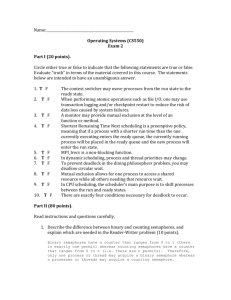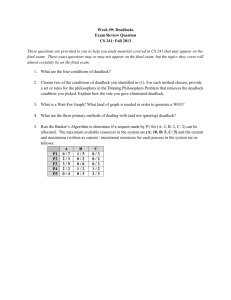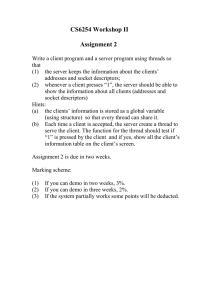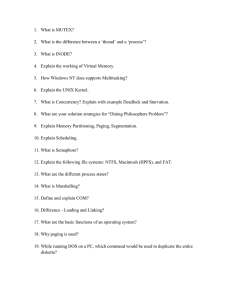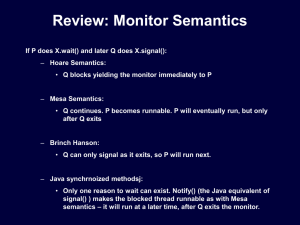CPS110: Deadlock February 4, 2009 Landon Cox
advertisement
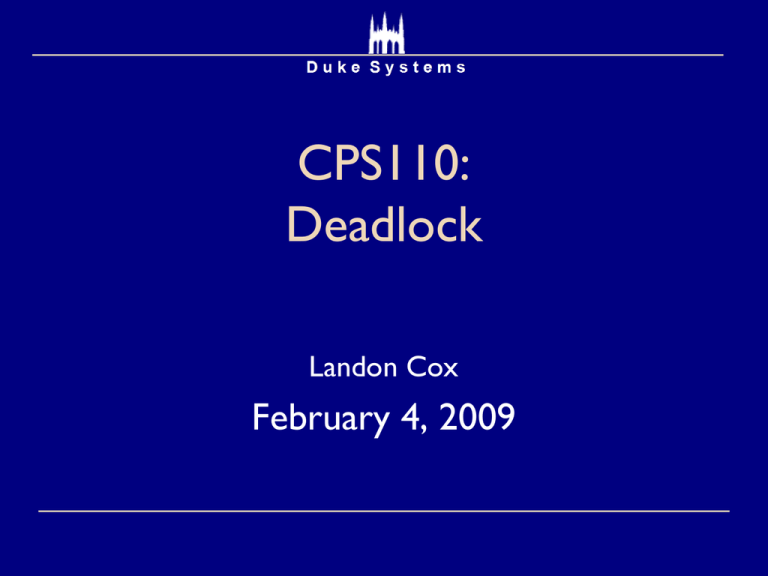
CPS110:
Deadlock
Landon Cox
February 4, 2009
Concurrency so far
Mostly tried to constrain orderings
Locks, monitors, semaphores
It is possible to over-constrain too
A must run before B
B must run before A
This can lead to deadlock
Definitions
Resource
Thing needed by a thread to do its job
Threads wait for resources
E.g. locks, disk space, memory, CPU
Deadlock
Circular waiting for resources
Leaves threads unable to make progress
Example deadlock
Both CPS108 and CPS110 are full
You want to switch from 110 to 108
Someone else wants to switch from 108 to 110
Algorithm for switching
Wait for spot in new class to open up
Add new class
Drop old class
Problem: must add before dropping
Deadlock and starvation
Deadlock starvation
Starvation = one process waits forever
Thread A
Thread B
lock (x)
lock (y)
…
unlock (y)
unlock (x)
lock (y)
lock (x)
…
unlock(x)
unlock(y)
Can deadlock occur?
Deadlock and starvation
Deadlock starvation
Starvation = one process waits forever
Thread A
Thread B
lock (x)
lock (y)
lock (y) // wait for B
lock (x) // wait for A
WillCan
deadlock
deadlock
always
occur?
occur?
Common thread work pattern
Phase 1.
Phase 2.
while (not done) {
get some resources (block if necessary)
work // assume finite
}
release all resources
Has anyone taken CPS116 (databases)?
This is called “two-phase” locking
Ensures “conflict-serializability”
Still deadlock-prone
Dining philosophers
Philosopher algorithm
1) Wait for right chopstick
2) Pick up right chopstick
3) Wait for left chopstick
4) Pick up left chopstick
5) Eat
6) Put both chopsticks down
How can deadlock occur?
A
E
B
D
C
Conditions for deadlock
1. Limited resource
Not enough for all threads simultaneously
2. Hold-and-wait
Hold one resource, while waiting for another
3. No pre-emption
Cannot force threads to give up resources
4. Circular chain of requests
Circular chain of requests
Arrows
Thread resource it’s waiting for
Resource thread that’s holding it
Thread A
Resource 1
Thread B acquires Resource 1
Thread B waits for Resource 2
Thread A acquires Resource 2
Thread A waits for Resource 1
Resource 2
Thread B
Called a wait-for graph
Deadlock
What should we do about them?
1. Ignore them
Common OS-level solution for programs
(OS has no control over user programs)
2. Detect-and-fix
3. Prevent
Detect-and-fix
First part: detect
This is easy; just scan the wait-for graph
Second part: fix
1.
Kill first thread, take back resources by force
Why might this be unsafe?
Can expose inconsistent state
2.
Roll-back actions of 1 or more thread, retry
Often used in databases
Not always possible (some actions can’t be undone)
E.g. can’t unsend a network message
Detect-and-fix
Retrying during fix phase can be tricky
If holding R and will wait for L, drop R and try again.
What could happen?
Everyone picks up R
Everyone drops R
Everyone picks up R
Everyone drops R
(and so on)
This is called “livelock.”
A
E
B
D
C
Detect-and-fix
Retrying during fix phase can be tricky
If holding R and will wait for L, drop R and try again.
How to prevent livelock?
Choose a winner.
How to choose a winner?
E
First to start/pick up?
What if we have priorities?
(called “priority inversion”)
e.g. Queen waiting for joker
Should Queen always win?
No, could starve the joker
A
B
D
C
Deadlock prevention
Idea: remove one of four pre-conditions
1. Make resources unlimited
Best solution, but often impossible
Can still increase number, reduce likelihood
(larger 108 and 110 classes)
Not clear this works for locks
Deadlock prevention
2. Eliminate hold-and-wait
Idea: move resource acquisition to beginning
Phase 1a. get all resources
Phase 1b. while (not done) {
work // assume finite
}
Phase 2. release all resources
Two ways to avoid holding while waiting
Eliminating hold-and-wait
1.
Wait for everything to be free, then grab them all at once
Philosopher algorithm
lock
while (left chopstick busy ||
right chopstick busy) {
wait
}
pick up right chopstick
pick up left chopstick
unlock
eat
lock
drop chopsticks
unlock
Any potential problems?
Can induce starvation (neighbors alternate eating).
Eliminating hold-and-wait
2.
If you find a resource busy, drop everything, and try again
Philosopher algorithm
lock
while (1) {
while (right chopstick busy) {
wait
}
pick up right chopstick
if (left chopstick busy) {
drop right chopstick
} else {
pick up left chopstick
break
}
}
unlock
eat
lock
drop chopsticks
unlock
Issues?
Must predict what you need in advance.
Hold reservations longer than needed
Requires changes to applications.
Deadlock prevention
3. Enable pre-emption
Can pre-empt the CPU (context switch)
Can pre-empt memory (swap to disk)
Not everything can be pre-empted
Can locks be pre-empted?
Probably not
Must ensure that data is in consistent state
Deadlock prevention
4. Eliminate circular chain of requests
How can we get rid of these cycles?
Impose an ordering on resource acquisition
E.g. must always acquire A before B
In dining philosophers?
Number chopsticks
Pick up lower-numbered chopstick first
Dining philosophers
Philosopher algorithm
1) Wait for lower chopstick
2) Pick up lower chopstick
3) Wait for higher chopstick
4) Pick up higher chopstick
5) Eat
6) Put both chopsticks down
A
1
2
E
B
5
Try to create a deadlock
3
D
C
4
Universal ordering
Why does this work?
At some point in time
T holds highest-numbered acquired resource
T is guaranteed to make progress. Why?
If T needs a higher-numbered resource, it must be free
If T needs a lower-numbered resource, it already has it
If T can make progress, it will eventually release all of its resources
What if another thread acquires a higher-numbered resource?
They just become T
(in which case, the same reasoning as above holds)
Dining philosophers
Philosopher algorithm
1) Wait for lower chopstick
2) Pick up lower chopstick
3) Wait for higher chopstick
4) Pick up higher chopstick
5) Eat
6) Put both chopsticks down
A
1
2
E
B
5
What if E only needs one chopstick?
Only have trouble if E acquires lowernumbered chopstick before 5.
(but this is a violation of our rule)
3
D
C
4
Deadlock avoidance
Issue with imposing global orderings
Must change the application
Common technique
Requires programming discipline
Course administration
Project 1
Due February 18th (two weeks)
6 groups are done with 1d
No one has submitted 1t yet (!)
Should be done with 1d by end of the week
1t is a lot more work, don’t keep putting it off!
Compiling
g++ -o disk disk.cc thread.o
Course administration
Remember to work on your thread library test suite too
For each of your test cases
Compare output of your library with thread.o
Writing test cases
Read through spec
Write test cases to stress each required part
E.g. lock() blocks if lock is already held
Use yield() to create the right interleavings
Read through your code
Write test cases to exercise all lines of code
E.g. each clause of an if/else statement
Micro-tests are better for debugging than macro-tests
Banker’s algorithm
Like acquiring all resources first
(but more efficient)
Phase 1a. state max resources needed
Phase 1b. while (not done) {
get some resources (blocking if not SAFE)
work // assume finite
}
Phase 2. release all resources
Comparing banker’s algorithm
Original
Acquired resources if available (deadlock)
Previous solution (no “hold-and-wait”)
Acquired all resources or none
Must acquire max resources to do work
All threads doing work own their max
Thus, all threads doing work can complete
Banker’s algorithm
Give out resources at request time (1b)
Request granted if it is safe
Can grant max requests of all threads in some sequential order
Sequential order
One thread gets its max resources, finishes, and releases its resources
Another thread gets its max resources, finishes, and releases, etc
Phase 1a. state max resources needed
Phase 1b. while (not done) {
get some resources (blocking if not SAFE)
work // assume finite
}
Phase 2. release all resources
Example
Bank
Has $6000 to loan
Customers
Establish credit limits (max resources)
Borrow money (up to their limit)
Return all money at the end
Example: Solution 1
Bank gives money on request, if available
For example
Ann asks for credit line of $2000
Bob asks for credit line of $4000
Cat asks for credit line of $6000
Can bank approve each of these lines?
(assuming it gives money, if available)
Example: Solution 1
No. Consider:
Ann takes out $1000 (bank has $5000)
Bob takes out $2000 (bank has $3000)
Cat takes out $3000 (bank is empty)
Bank has no money
Ann, Bob, and Cat could all ask for $
None would be able to finish (deadlock)
Example: Solution 1
This only works if we wait to approve credit lines
For example
Ann asks for credit line of $2000
Bank approves
Bob asks for credit line of $4000
Bank approves
Cat asks for credit line of $6000
Bank must make Cat wait until Ann or Bob finish
Sum of all max resource needs of all current threads
Must not exceed the total resources
Example: Solution 2
Bank says ok to all credit line requests
Customers may wait for resources
Bank ensures no deadlocks
For example
Ann asks for credit limit of $2000
Bob asks for credit limit of $4000
Cat asks for credit limit of $6000
Bank approves all credit limits
Example: Solution 2
Ann takes out $1000 (bank has $5000)
Bob takes out $2000 (bank has $3000)
Cat wants to take out $2000
Is this allowed?
Bank would be left with $1000
Ann would still be guaranteed to finish
(could take out another $1000)
On finish, bank would have $2k
This is enough to ensure that Bob can finish
Example: Solution 2
Ann takes out $1000 (bank has $5000)
Bob takes out $2000 (bank has $3000)
Cat wants to take out $2500
Is this allowed?
Bank would be left with $500
Can’t guarantee that any threads will finish
Banker’s algorithm
Allows resources to be overcommitted
How can we apply this to dining philosophers?
Put all chopsticks in the middle of the table
Max resource need for each philosopher is 2
Grant requests, unless
There is only one chopstick left and nobody has 2
Nice algorithm, but few people use it. Why?
You rarely know what you’ll need in advance
Doesn’t really make sense for locks (no “generic lock”)
